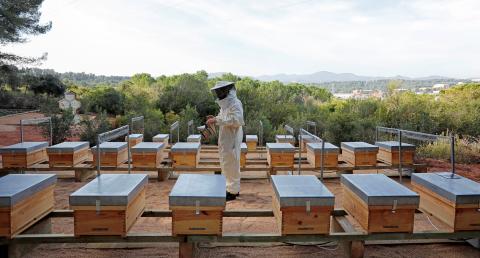Àltima creates new spaces to promote bee protection at Roques Blanques and Sitges cemeteries

El Papiol / Sitges (Barcelona), May 19, 2021.— Àltima has intensified its commitment to the protection and promotion of the environment at two of the cemeteries it manages: the regional Parc Roques Blanques in El Papiol and Les Pruelles in Sitges. In line with its policy of sustainable and environmentally respectful management, the funeral company has strengthened its efforts to support the natural pollination function of bees in the areas surrounding the two cemeteries, which are located within the Collserola Natural Park and the Garraf Natural Park, respectively.
At Roques Blanques, Àltima will expand the educational apiary established last September, which currently houses 50 hives. This expansion will include two additional beehives, each with 25 hives, strategically placed around the cemetery's perimeters, surrounded by vegetation, and isolated from main pathways and burial areas. With this expansion, Roques Blanques will have a total of 100 hives, which will support the pollination of over 1.5 billion flowers daily. Additionally, the Les Pruelles cemetery in Sitges is also planning an educational beekeeping project similar to the one at Roques Blanques.
Joan Ventura, General Director of Cemeteries at Àltima, explains, “Our commitment to defending and promoting the environment is long-standing. We are fully aware of the privileged natural space where these cemeteries are located, which is why, from the very beginning, we have based our management on a sustainable strategy that integrates cemetery and nature.” The new project supporting bees and their pollination work “is another step in our contribution to improving these natural parks that surround us, which are heavily threatened by the proximity of urban areas.” Indeed, factors such as human activity, pollution, climate change, and pesticide use are severely impacting bee populations, which have significantly declined in recent years worldwide. Their preservation is crucial for maintaining ecosystems and, ultimately, our survival, as more than 75% of global food crops require pollination, according to the World Health Organization (WHO). Through environmental responsibility, “Àltima also aims to offer a new way to bring cemeteries closer to the public, breaking many taboos related to these spaces,” adds Joan Ventura.
Educational Apiaries to Promote Bee Awareness
Last September, Roques Blanques became the first cemetery in Spain to install an educational apiary, a model that will soon be replicated at Les Pruelles in Sitges. Due to their special characteristics, the two educational apiaries aim to achieve three main objectives: environmental, educational, and social.
On the environmental level, the projects promote the protection of bees as key pollinators, essential for the ecosystem and biodiversity of the area. Educationally, the apiaries encourage social awareness through dissemination, learning, and interpretation of the world of these hymenopterans, promoting guided and free visits for groups and families (schools, elderly care homes, companies, etc.). Lastly, there is also a social and solidarity aspect, reinforcing commitment and involvement with organizations that work with vulnerable or at-risk groups. In this context, Àltima is collaborating with Esclatec, a leading company in the labor integration of people with multiple disabilities, to produce “candles with a cause” from pure natural wax, which will be donated to the families using the cemeteries.
The beekeeping management of the hives, handled by Melvida’s beekeepers, follows the principles of artisanal, responsible, and ecological beekeeping, based on a sustainable production model that prioritizes the well-being of the bees (specifically the native species, Apis mellifera) and respects their biological rhythm and ecosystem restoration role, without production goals or stress.
Àltima and Sustainability
The educational apiary projects at Roques Blanques and Les Pruelles represent a further step by Àltima in preserving the cemeteries' environments, spaces often surrounded by nature or near natural parks. In this vein, for years, both facilities have developed a sustainable management strategy that, in terms of burials, has translated into ecological alternatives for ashes, pioneering in Spain, such as the Forest Path, Family Trees, or Rest Fountain at Roques Blanques; and the Poppy Garden and Rain Urns at Les Pruelles.